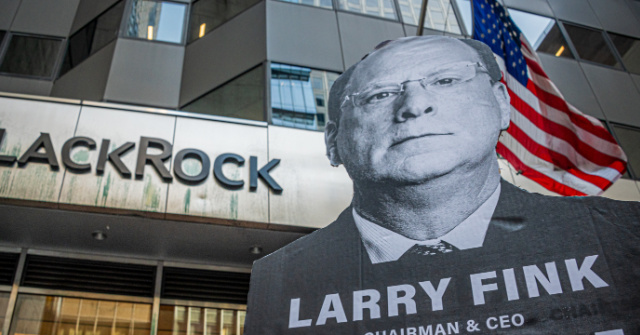

BlackRock Chairman and CEO Larry Fink has done more than anyone else to popularize the concept of “shareholder capitalism.”
The shareholder capitalist’s goal is to recalibrate people’s mindsets about banking and investing so that they take into account emotions and cultural sensibilities when evaluating the quality of a business. If shareholder capitalists control the future, the path to creating long-term wealth will not only look at the balance sheet but also at the ethereal sentiments of customers, suppliers, employees, and communities.
The widespread adoption of this basic philosophy has, to this point, been brought about via Environmental, Social, and Governance (ESG) investing. ESG has been one of the of the globalist left’s most powerful tools. It has helped alter consumer and investor priorities so that they are more likely to support a company that upholds the left’s political values. It doesn’t matter if the company relies on slave labor, pollutes the earth, or is owned by oligarchs, so long as it is a good company. How do you become a good company? By publicly promoting diversity, environmentalism, and other woke causes. Simple.
Would you invest in a company that doesn’t display the trans flag on their social media accounts during Pride month or tweet platitudes about climate change and Ukraine? If you do, you might be supporting bad companies and you might be bad yourself. ESG is a simple yet effective way of using social shaming to bring about radical change.
Luckily, it appears as though enough consumers and investors have caught on to Fink and the globalists’ true motives—just as the various populist movements around the world have caught on to the agenda of Fink’s Davos friends at the World Economic Forum (WEF). The political kowtowing to the whims of the woke left has not helped businesses like Disney or Target or brands like Bud Light, as this newsletter and Breitbart.com has thoroughly documented. There is plenty of evidence that a lot of companies that go woke do not, in fact, go broke; but clearly Fink is feeling the pressure given the high-profile struggles of a few iconic brands like the ones we just mentioned.
Fink suggested on Sunday at the Aspen Ideas Festival that the term Environmental, Social, and Governance (ESG) is past its sell-by date, arguing it has been “politically weaponized.” This is true. Much like terms “fake news” and “woke,” the political right has co-opted “ESG” from the left and repurposed it for our political benefit.
He also noted that he is “ashamed” to be part of the debate on ESG, though he did follow up to say that he is not ashamed to be a believer in “conscientious capitalism.”
So, what are we to read into this sentiment from one of the world’s most powerful asset managers? We believe that just because the term “ESG” might go away in name, it certainly won’t go away in deed. It will take more than a few protests and changes in beer buying patterns to bring about a hard reset of global capitalism. But this is a good sign, nonetheless. After all, Fink isn’t recommending a rebrand because he is confident in the woke capitalism movement.
Yet, it’s still imperative that we remain diligent. It’s easy to declare victory too early. The board rooms of most multinational conglomerates are still loaded with activist globalists who see corporations as the way to bring about social change, and they won’t all agree with Fink or take his advice. Besides, some of the most effective activist corporations do their worst when they are at their most quiet. You don’t need to make commercials about toxic masculinity or make movies about men with periods to advance the cause of wokeness.
There is reason to rejoice, but there is a lot of work to do.




